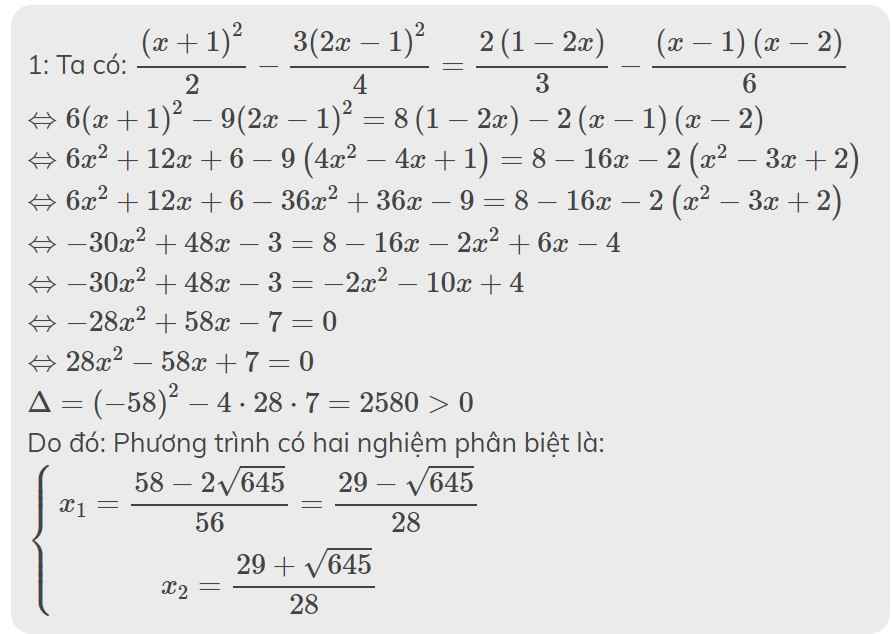

Hãy nhập câu hỏi của bạn vào đây, nếu là tài khoản VIP, bạn sẽ được ưu tiên trả lời.



1: Ta có: \(\dfrac{\left(x+1\right)^2}{2}-\dfrac{3\left(2x-1\right)^2}{4}=\dfrac{2\left(1-2x\right)}{3}-\dfrac{\left(x-1\right)\left(x-2\right)}{6}\)
\(\Leftrightarrow6\left(x+1\right)^2-9\left(2x-1\right)^2=8\left(1-2x\right)-2\left(x-1\right)\left(x-2\right)\)
\(\Leftrightarrow6x^2+12x+6-9\left(4x^2-4x+1\right)=8-16x-2\left(x^2-3x+2\right)\)
\(\Leftrightarrow6x^2+12x+6-36x^2+36x-9=8-16x-2\left(x^2-3x+2\right)\)
\(\Leftrightarrow-30x^2+48x-3=8-16x-2x^2+6x-4\)
\(\Leftrightarrow-30x^2+48x-3=-2x^2-10x+4\)
\(\Leftrightarrow-28x^2+58x-7=0\)
\(\Leftrightarrow28x^2-58x+7=0\)
\(\text{Δ}=\left(-58\right)^2-4\cdot28\cdot7=2580>0\)
Do đó: Phương trình có hai nghiệm phân biệt là:
\(\left\{{}\begin{matrix}x_1=\dfrac{58-2\sqrt{645}}{56}=\dfrac{29-\sqrt{645}}{28}\\x_2=\dfrac{29+\sqrt{645}}{28}\end{matrix}\right.\)

Bài 1:
\(\left(-\dfrac{72}{40}-\dfrac{144}{60}-2\dfrac{1}{3}\right):\left(\dfrac{45}{100}-\dfrac{25}{60}+-\dfrac{75}{25}\right)\)
\(=\left(-\dfrac{9}{5}-\dfrac{12}{5}-\dfrac{7}{3}\right):\left(\dfrac{9}{20}-\dfrac{5}{12}+-3\right)\)
\(=\left(-\dfrac{27}{15}-\dfrac{36}{15}-\dfrac{21}{15}\right):\left(\dfrac{27}{60}-\dfrac{25}{60}+-3\right)\)
\(=\left(-\dfrac{28}{5}\right):\left(-\dfrac{89}{30}\right)\)
\(=\left(-\dfrac{28}{5}\right).\left(-\dfrac{30}{89}\right)\)
\(=\dfrac{168}{89}\)

1. a, 3x + |x - 2| = 8
<=> |x - 2| = 8 - 3x
Xét 2 TH :
TH1: x - 2 = 8 - 3x
<=> x + 3x = 8 + 2
<=> 4x = 10
<=> x = \(\dfrac{5}{2}\) (thỏa mãn)
TH2: x - 2 = -(8 - 3x)
<=> x - 2 = -8 + 3x
<=> -2 + 8 = 3x - x
<=> 6 = 2x
<=> x = 3 (thỏa mãn)
b, 5 - |x - 1| = 4
<=> |x - 1| = 1
<=> \(\left[{}\begin{matrix}x-1=1\\x-1=-1\end{matrix}\right.\Leftrightarrow\left[{}\begin{matrix}x=2\\x=0\end{matrix}\right.\) (thỏa mãn)
@Nguyễn Hoàng Vũ
2. 5.(x - 2) - 4.(1 - 3x) = |3 - 7| + 2.(1 + 2x)
<=> 5x - 10 - 4 + 12x = 4 + 2 + 4x
<=> 17x - 14 = 6 + 4x
<=> 17x - 4x = 6 + 14
<=> 13x = 20
<=> x = \(\dfrac{20}{13}\) (thỏa mãn)
@Nguyễn Hoàng Vũ

\(\Leftrightarrow\dfrac{2}{3}x+\dfrac{4}{3}-\dfrac{5}{4}x+\dfrac{5}{4}=\dfrac{15}{2}-\dfrac{3}{2}x-\dfrac{3}{2}\left(2x+3\right)\)
\(\Leftrightarrow x\cdot\dfrac{-7}{12}+\dfrac{31}{12}=\dfrac{-15}{2}x+3\)
=>83/12x=5/12
hay x=5/83

1. \(\dfrac{x-2}{3}-\dfrac{2\left(3+2x\right)}{5}-\dfrac{5\left(1-x\right)}{6}=\dfrac{3\left(1+x\right)}{2}\)
<=> \(\dfrac{x}{3}-\dfrac{2}{3}-\dfrac{6+4x}{5}-\dfrac{5-5x}{6}=\dfrac{3+3x}{2}\)
<=> \(\dfrac{x}{3}-\dfrac{2}{3}-\dfrac{6}{5}-\dfrac{4x}{5}-\dfrac{5}{6}+\dfrac{5x}{6}=\dfrac{3}{2}+\dfrac{3x}{2}\)
<=> \(\dfrac{x}{3}-\dfrac{4x}{5}+\dfrac{5x}{6}-\dfrac{3x}{2}=\dfrac{3}{2}+\dfrac{2}{3}+\dfrac{6}{5}+\dfrac{5}{6}\)
<=> \(-\dfrac{17}{15}x=\dfrac{21}{5}\)
<=> x = \(-\dfrac{63}{17}\)
@Nguyễn Hoàng Vũ
2. Một giờ người đi từ A đi được :
1 : 2 = \(\dfrac{1}{2}\) (quãng đường)
Một giờ người đi từ B đi được :
1 : 3 = \(\dfrac{1}{3}\) (quãng đường)
Một giờ cả 2 người đi được :
\(\dfrac{1}{2}+\dfrac{1}{3}=\dfrac{5}{6}\) (quãng đường)
Hai người họ gặp nhau sau :
1 : \(\dfrac{5}{6}=1\dfrac{1}{5}h=1h12'\)
Vậy 2 người họ gặp nhau lúc :
7h + 1h12' = 8h12'
Đáp số : 8h12'
@Nguyễn Hoàng Vũ

\(\dfrac{11.3^{22}.3^7-9^{15}}{\left(2.3^{14}\right)^2}\)
\(=\dfrac{11.3^{29}-\left(3^2\right)^{15}}{2^2.3^{28}}\)
\(=\dfrac{11.3^{29}-3^{30}}{2^2.3^{28}}\)
\(=\dfrac{3^{29}\left(11-3\right)}{2^2.3^{28}}\)
\(=\dfrac{3^{29}.2^3}{2^2.3^{28}}\)
\(=\dfrac{3.2}{1.1}=6\)

1: \(S=\dfrac{3}{2}\cdot\dfrac{4}{3}\cdot\dfrac{5}{4}\cdot...\cdot\dfrac{101}{100}=\dfrac{101}{2}\)
2: \(B=\dfrac{1}{2}\cdot\dfrac{2}{3}\cdot\dfrac{3}{4}\cdot...\cdot\dfrac{2006}{2007}=\dfrac{1}{2007}\)